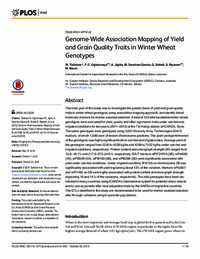Genome-Wide Association Mapping of Yield and Grain Quality Traits in Winter Wheat Genotypes

Authors:
The main goal of this study was to investigate the genetic basis of yield and grain quality traits in winter wheat genotypes using association mapping approach, and identify linked molecular markers for marker assisted selection. A total of 120 elite facultative/winter wheat genotypes were evaluated for yield, quality and other agronomic traits under rain-fed and irrigated conditions for two years (2011-2012) at the Tel Hadya station of ICARDA, Syria. The same genotypes were genotyped using 3,051 Diversity Array Technologies (DArT) markers, of which 1,586 were of known chromosome positions. The grain yield performance of the genotypes was highly significant both in rain-fed and irrigated sites. Average yield of the genotypes ranged from 2295 to 4038 kg/ha and 4268 to 7102 kg/ha under rain-fed and irrigated conditions, respectively. Protein content and alveograph strength (W) ranged from 13.6-16.1% and 217.6-375 Jx10-4, respectively. DArT markers wPt731910 (3B), wPt4680 (4A), wPt3509 (5A), wPt8183 (6B), and wPt0298 (2D) were significantly associated with yield under rain-fed conditions. Under irrigated condition, tPt4125 on chromosome 2B was significantly associated with yield explaining about 13% of the variation. Markers wPt2607 and wPt1482 on 5B were highly associated with protein content and alveograph strength explaining 16 and 14% of the variations, respectively. The elite genotypes have been distributed to many countries using ICARDA's International system for potential direct release and/or use as parents after local adaptation trials by the NARSs of respective countries. The QTLs identified in this study are recommended to be used for marker assisted selection after through validation using bi-parental populations.
